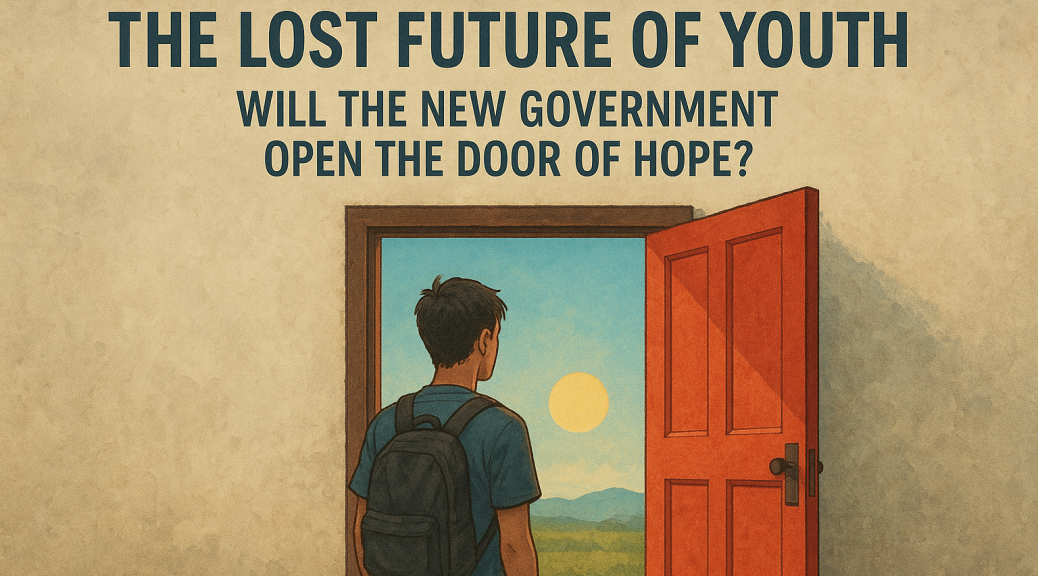
The Lost Future of Our Youth:Will the New Government Open the Door of Hope
Not long ago, a post on Facebook shook me. A Bangladeshi man in France shared that he earned 169 euros- about 21,000 taka- after driving Uber for 12 hours. He wrote with pride, saying this is why he risked his life crossing the sea. In his mind, that backbreaking shift was worth more than a whole month’s struggle in Bangladesh.
That story carries the bitter taste of truth. But should risking your life on a dark sea ever be the price of dignity? To him it seemed the only path. But deep down we know—this is not the future our youth deserve.
So, the question burns: what future are we offering our young people?
Graduates with prized degrees roam without work. Those who do find jobs are underpaid, undervalued, and crushed by frustration. No wonder driving for minimum wage abroad feels like “success.” No wonder more than half of our youth dream of leaving the country. A British Council report shows 55% want to go abroad for study or work. Forty-two percent worry about unemployment. One-third of unemployed educated youth drift into crime.
Tell me, how long can a nation survive like this?
And if they do go abroad, are they destined only to drive Ubers and wash dishes? Is that the sum of their talent and ambition? Absolutely not. Our youth are not meant for scraps. They are meant to lead, to create, to compete at the highest levels of the global economy.
Yet, right now, too many are simply stuck. A survey shows 40% of Bangladeshi youth are “inactive”- not in school, not in training, not in work. Among young women, that number climbs past 60%. Numbers like these should break our pride into pieces.
We often boast of the “demographic dividend.” We talk about our youth as our strength. But what good is a dividend if we don’t invest it wisely? What good is a dream if it ends in despair?
Here is the root: our education system. It produces degrees, but not the skills employers demand. That is why so many graduates sit idle. That is why the best minds pack their bags.
The solution is not charity. The solution is not blind hope. The solution is skills- real, work-ready skills. Education that matches the market. Classrooms that prepare students not for unemployment, but for contribution.
At Washington University of Science and Technology in the US, we built such a model. It is simple but powerful: Degree, Skills, Career. Students don’t just memorize. They practice. They learn from professors who are also industry experts, who bring 18 years of real-world experience straight into the classroom. The class becomes a workplace. The workplace becomes a future.
Why is this urgent? Because the world has already changed. Entry-level jobs are vanishing—swallowed by AI. Generative AI agents now do the simple tasks that once gave millions a living. Survival now demands higher-level skills. Only those who master the new tools will thrive.
Bangladesh cannot wait. We need a revolution in our universities. AI, machine learning, big data, cybersecurity, cloud, fintech, green energy, digital health, creative media- these must be our frontlines. If we do not prepare, we will be left behind.
From my two and a half decades of experience, I can identify the key sectors Bangladesh must prioritize:
1. Artificial Intelligence (AI) – Agentic AI, Computer Vision, NLP
2. Machine Learning & Deep Learning – Predictive Analysis, Automation
3. Data Science & Big Data
4. IT & Software Development – Programming, Cybersecurity
5. Cloud Computing & DevOps
6. FinTech & Digital Finance
7. Digital Marketing & Content Creation
8. Healthcare & Medical Technology
9. Green Energy & Environmental Technology
10. Construction & Engineering Tech
11. Agricultural Technology
12. Creative Media & Entertainment
13. Business & Project Management
14. Textile & Garments High-Tech
15. Transport & Logistics
Just imagine the opposite. Imagine a Bangladesh where every graduate leaves not just with a certificate, but with skills employers trust. Where students build personal brands online, speak fluent English, and connect with the global marketplace. Where they don’t chase jobs, but create them- through innovation, entrepreneurship, and courage.
This is not a fantasy. With the right changes, the 3.4 million students of our National University system alone could become the greatest workforce engine in South Asia. Give them direction, give them training, give them hope- and they will build a new Bangladesh with their own hands.
And here is the truth I believe with all my heart: our youth are not a burden. They are not statistics. They are a storm of energy, a force of dreams, a river of possibility. They are the spark that can set this nation ablaze with progress.
The new government has a choice. They can let despair fester- or they can light the flame of trust. They can open the door of hope. If they choose the latter, our youth will rise- not as job seekers, but as leaders. Not as wanderers, but as world citizens.
The future of Bangladesh is not written in fear. It is waiting in the hands of our youth. Give them the skills. Give them the faith. And watch them transform this nation into one that doesn’t just survive- but leads.
Writter: Abubokor Hanip, Chairman & Chancellor of Washington University of Science and Technology, and the Founder & CEO of PeopleNTech.
Source: The New Nation